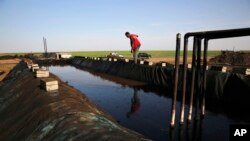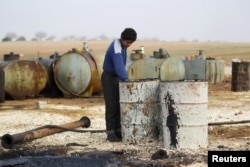While Syria's 7-year civil war has had an impact on nearly all aspects of life in the country, it also has provided many Syrians working in the oil sector with new job opportunities.
In the northeastern corner of Syria, the large oil fields have one common theme: makeshift oil refineries.
The refining process involves an ad hoc oil burner and large containers with crude oil.
But many locals complain that such primitive ways to produce and refine oil are leaving a major impact on their health and the environment they live in.
Oil workers recognize the risks that come with their profession, but they say unemployment forced them into it.
"We work at these oil refineries because there aren't many job opportunities in our region," Nasir Talif, an oil worker in the town of Tirbespi, told VOA.
"It's dangerous and unhealthy, but we don't have many choices," he added.
WATCH: Syria's Makeshift Oil Refineries Spark Concerns
Since the beginning of the war in Syria in 2011, nearly half of the country's 22 million people have been displaced. Those who remain face high rates of unemployment.
Local economy
Hamid Maiouf, another oil worker, said "there are many factors leading us to work in this dangerous profession. The war in Syria has impacted the local economy."
He told VOA that "working in agriculture is not as profitable anymore because of the drought. That's why you see a lot of people getting into the business of oil refining, despite its risks."
Syria's richest oil fields lie in the Kurdish-majority Hasaka province. There are more than 1,300 oil wells across Hasaka. Prior to 2011, daily production of crude oil in the province reached about 22,000 cubic meters, or approximately 150,000 barrels per day, according to Syrian government statistics. In total, Syria produced about 47,696 cubic meters, or 300,000 barrels per day, before the war.
"Working in the oil business is the only source of income for many families around here. So, we can't call for ending this practice," said Saleh Ali, a resident of the province. "We just need to find a way to eliminate the risks involved with it. Our children and environment are heavily affected by this practice."
Local health groups recently have reported a dramatic increase in diseases caused by oil pollution.
"In the last two months, we received about 675 people who have been diagnosed with diseases resulting from oil refining, such as allergies, respiratory complications," said Hind Osman of the Kurdish Red Crescent.
She added that at least 80 of those people were patients with pre-existing diseases such as asthma.
Local officials said they have been running awareness campaigns to help educate people on the risks of refining oil locally.
"Three months ago, we issued a public notice that all workers at local oil burners must use gas flares that destroy sulfur dioxide, which is a toxic component that pollutes the environment," Tariq Mohammed, an official at the Kurdish-led Environment Commission, told VOA.
YPG
The Kurdish People's Protection Units (YPG) took control of the region in 2012 after Syrian government troops withdrew to focus on fighting rebels elsewhere in the country.
The YPG has since benefited financially from producing and transporting oil to other parts of Syria.
But the war against the Islamic State terror group halted oil transportation from the Kurdish region to the country's two refineries in the Syrian regime-held cities of Banias and Homs.
In early 2015, IS damaged the major pipeline that was connecting the oil fields in the northeast to both refineries.
According to a local oil engineer who requested anonymity, the YPG has continued shipping oil to regime-held areas, using a private cargo company.
He estimated the current oil production in the Kurdish region at 6,359 cubic meters, or 40,000 barrels per day.
In July, a Kurdish delegation met with Syrian government officials in Damascus to talk about the future of northeast Syria. Oil was one the main topics discussed, according to local media reports.







